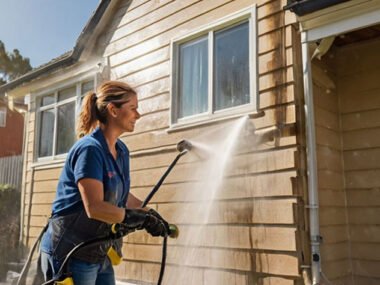Owning a house sounds cool until something breaks. Then it’s suddenly “Where’s the toolbox?” or “Do we even know how to fix this?” And yeah, sometimes things fall apart faster than anyone expects. A leaky faucet turns into water damage. A squeaky floor becomes a safety problem. It starts small—but if no one handles it, the problems stack up.
The good news is that keeping a home together doesn’t mean learning how to build one from scratch. It’s really about staying on top of little things, knowing when to ask for help, and not waiting until everything’s falling apart at once.
The Small Problems Are the Big Problems in Disguise
Here’s the thing a lot of people don’t realize: most of the big repair jobs didn’t start big. That crack in the wall? It used to be a tiny chip. The dripping faucet? Just needed a washer at first. But ignoring those things—or putting them off for too long—makes them worse.
That’s why noticing small problems early is a big deal. It saves time, money, and the stress of a full-on repair later. And honestly, not every fix has to be a DIY project.
Some repairs are just easier when done by someone who knows what they’re doing. For example, if there’s a weird draft coming from the window frame or the door keeps sticking no matter how many times it’s sanded down, it might be time to call in a pro. Services like Surprise, AZ Handyman Services are super helpful because they can handle all the weird, random repairs that pop up—and get them done right the first time.
Why Waiting Makes Things Worse
A house doesn’t suddenly fall apart. It happens slowly, and usually because everyone assumes the problem “isn’t that bad yet.” But when repairs get pushed off again and again, the damage spreads.
A loose tile in the bathroom might seem harmless until water gets underneath and wrecks the floorboards. A tiny bit of peeling paint might be hiding mold or water damage. Even outdoor problems—like a wobbly fence or a broken gate—can turn into expensive headaches if they’re ignored.
It’s not just about how things look. It’s about how things work. A home that’s falling apart feels stressful. Things don’t open or shut properly. Rooms feel colder or hotter than they should. Lights flicker, doors creak, floors sag. And all of that makes everyday life a lot more annoying than it needs to be.
What Actually Helps: Doing a Little at a Time
One of the easiest ways to keep a house in shape is to stop trying to fix everything all at once. The best approach is breaking it down. One week it might just be checking for loose handles or wobbly shelves. Another week it could be making sure there’s no weird leak under the sink.
That’s how real progress happens—slowly, but steadily. Some people even keep a running list of little issues around the house. That way, when they have time or call in a handyman, everything’s in one place and easier to manage.
Even 30 minutes on a Saturday is enough to tighten screws, check for cracks, or replace a burned-out lightbulb. Those small actions keep the bigger repairs from ever being needed.
When It’s Better to Ask for Help
There’s nothing wrong with trying to fix things alone—some repairs are totally doable. But there’s also no shame in calling someone who actually knows how to fix it right. Especially when it comes to jobs involving:
- Electrical wiring
- Plumbing beyond a simple clog
- Drywall damage
- Door or window installation
- Roof or gutter issues
Getting it done wrong can be more expensive in the long run. A handyman usually comes with the tools, experience, and knowledge that make the repair last longer—and safer. Plus, they can spot problems most people don’t even notice.
The Mental Part: Keeping Calm About Repairs
It’s super easy to panic when it feels like everything’s breaking. But stressing over it won’t stop the faucet from leaking. What does help is remembering that no house is perfect. Even brand-new homes need repairs sometimes.
The key is not letting repairs feel like a mountain. They’re more like hills. Some are steeper than others, sure—but none of them are impossible to climb.
Even just walking through the house once a month and checking for weird sounds, smells, or signs of damage can make a huge difference. It gives a sense of control, and catching problems early means there’s no big emergency down the line.
Taking Care of the Boring Stuff
There are parts of home upkeep that aren’t exciting, but they matter a lot. Think about:
- Changing air filters
- Clearing out dryer vents
- Checking smoke alarms
- Cleaning out gutters
- Testing door locks
These little things help a home run smoothly and safely. They also make it easier to spot when something’s off. If a light stops working, it’s easier to figure out if it’s just the bulb or something else—because everything else is already taken care of.
It’s not glamorous. No one brags about cleaning a vent. But it’s the kind of boring that keeps emergencies from happening later.
When It’s More Than Just Repairs
Sometimes, a house doesn’t feel like it’s falling apart—but it doesn’t feel “right” either. That could be because something’s out of place, even if it’s not technically broken. A crooked shelf, a door that squeaks every time it opens, a towel rack that wiggles when used—it adds up.
Fixing those little annoyances makes a house feel more solid. More comfortable. More like it’s being cared for, instead of just survived in.
And that’s the real goal. A home doesn’t have to be perfect. It just has to feel safe, clean, and comfortable. A few repairs here and there help make that happen.
Quick Recap and What to Do Next
Houses don’t stay together by accident. They stay together when someone pays attention. Noticing problems early, handling small fixes, and getting help when needed keeps everything from crashing down later.
There’s no need to panic about every little thing that breaks. But ignoring problems doesn’t work either. The smartest move is to take it slow, do what’s possible, and call in a pro when it makes sense.
Start by checking what needs fixing. Even fixing one thing this week makes a difference. And if it’s too much? That’s exactly what handyman services are for.
Taking care of a house doesn’t have to feel like a big project. It’s just one fix at a time—and each one gets things closer to feeling just right.










